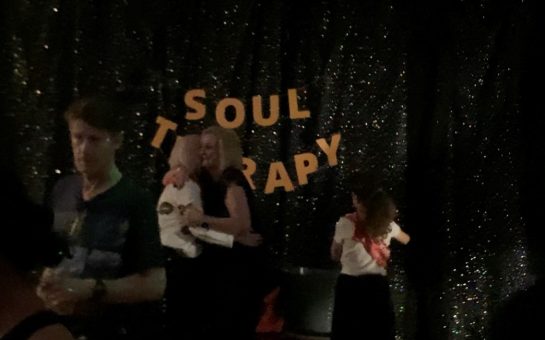You could say that vinyl is enjoying its moment in the sun, except if it really were, it would warp and be ruined. So the metaphor falls down pretty quickly.
Nevertheless, the vinyl revival is undeniable and the success of the giant discs is setting record after record.
Vinyl puns aside, this success has had notable ramifications for the music industry and music fans.
The resurgence of vinyl has turned the tables on convention – though arguably it does comply with our obsession with all things nostalgic and vintage.
The flourishing sale of vinyl bodes well for many artists who have struggled to rely on income from streaming sites such as Spotify.
Much has been said in recent years about the way streaming sites go about their business and the damaging effect it has on artists – often paying artists as little as £0.005 per play, meaning a song would have to be played 1,440 times an hour to meet the standards of the Government’s new National Living Wage.
Save the date: 16th April #RSD16 https://t.co/Ko5SktgNwC pic.twitter.com/Yypsra0KPG
— Record Store Day UK (@RSDUK) January 22, 2016
Artists typically stand to gain more, financially, from sales of physical copies of their music such as vinyl and CDs and so many will be pleased that, as CD sales continue to stagnate, vinyl sales are on the increase.
Last year in the US, sales of record raised more money (£294million) than sales of free streaming services like YouTube and Spotify combined (£282million).
However, speaking ahead of National Record Store Day on Saturday, Patrick Ryder, manager at Piccadilly Records, said he believes streaming has a place in the industry and a role to play in the promotion of lesser-known artists.
“As a record shop manager and vinyl obsessive, I’m always going to champion physical formats over streaming sites,” he told MM.
“That being said, companies like Spotify definitely have their benefits, allowing artists without a label to get their music into the wider world without the financial risks associated with physical products, which can be a good thing for creativity and freedom of expression.
“Unfortunately, this only goes so far and the model seems unsustainable for signed artists, or musicians looking for a more polished or ambitious sound.”
Patrick was less positive about the recent move by Sainsbury’s to stock vinyl again for the first time since the 1980s.
The move by Sainsbury’s follows Tesco’s decision to re-enter the record-selling business a year ago and has been met with a mixture of emotions – some believing it represents the strength of the vinyl resurgence while others see it as little more than corporate bandwagoning.
“Without wishing to be too cynical, it does seem like the supermarkets have stuck a finger in the air and dipped a toe into everyone’s favourite format,” said Patrick.
“I can’t imagine their experiment will last long once they realise that vinyl’s profit to space ratio lags a long way behind the rest of their inventory, but maybe the temporary excitement will see more people take an interest in wax, which could have some long term benefits.”
Recent criticisms of Record Store Day have suggested that the day doesn’t do enough for smaller record stores.
It’s arrived folks!!! @thirdmanrecords @Fortedistro @RSDUK #RSD16 pic.twitter.com/lPUCdjUmGm
— Piccadilly Records (@PiccadillyRecs) April 15, 2016
One record store owner in Scotland went so far as to condemn the event as ‘little more than a money-making enterprise’ in a recent interview with The Herald.
The criticism stems from a belief that record labels aren’t partaking in the spirit of the day but are instead using it to sell off old or irrelevant reissues of out-dated one-hit-wonders rather than producing fresh, unheard or limited edition copies only available on the day itself.
The result of this, in the eyes of some store owners, is that smaller shops suffer as their money gets tied up in record stock that they cannot sell.
Patrick is sceptical of this view, however, insisting that Record Store Day still holds a lot of value and meaning for music fans and record stores alike.
“Despite the yearly criticism from the touchlines, it’s still undeniable that RSD has been a massive boost for independent record shops,” he told MM.
“The increased attention and revived interest in vinyl has seen far more titles released on record in general, and along with that there’s been a definite rise in the number of reissues.
“Most of the titles we see getting a reissue are out of print and in demand so well worthy of another run.
“I understand how the increased strain on pressing plants causes problems for smaller labels, but surely the solution is more pressing plants rather than fewer records?”
Patrick also noted the striking scope and diversity of the list of Record Store Day releases year on year, offering up something for everybody.
He was particularly pleased with this year’s releases, noting a few choice cuts that he expected to do well.
“Naturally, there’s been a lot of excitement about the Bowie release this year and I’m sure that’ll be one of the first records to sell out,” he said.
“The staff have been looking longingly at the Requiem For A Dream OST, which makes its first appearance on vinyl this year, and the unreleased J Dilla set The Diary.”
This year looks set to be a great one at Piccadilly Records with various activities to keep vinyl enthusiasts enthused while waiting to score their picks of this year’s releases.
“We try to make Record Store Day as big an event as possible each year and this year’s no different,” he told MM.
Happy 1st birthday to the UK’s Official Vinyl Charts! #RSD16 https://t.co/814kLH72oT pic.twitter.com/oHphqVeHFB
— Record Store Day UK (@RSDUK) April 15, 2016
“We’ve enlisted a crack team of producers, label heads and DJs, including 6 Music legend Mary Anne Hobbs, to keep the queue moving and grooving throughout the day, while face painters will be on hand to transform any willing punters into their favourite David Bowie incarnation,” said Patrick.
Piccadilly Records also has Gwen & Michael Riley Jones on hand to photograph the event as well as running a book stall stocking their photographic tribute to the shop, ‘The Piccadilly Records Book’.
The BBC are popping in throughout the day and chatting to both the staff and shoppers about why vinyl matters to them.
There are also a limited number of free tote bags and mugs to reward the earliest risers.
The future looks good for fans of vinyl and Patrick is hopeful that the vinyl revival will continue.
“I’m hopeful that the resurgence of vinyl will continue as people seek out the warmer sound and physical connection it offers,” he said.
Image courtesy of Vinyl Factory, via YouTube, with thanks



